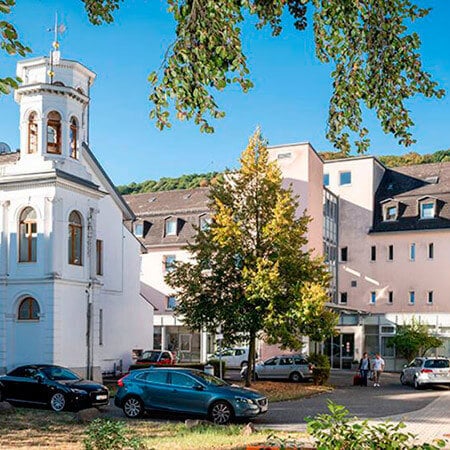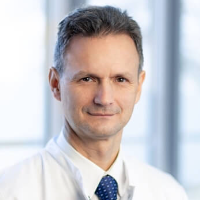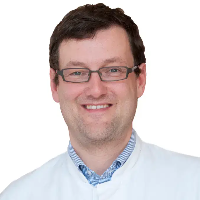Gamma Knife Surgery for Astrocytoma
Treatment prices are regulated by national law of the corresponding countries, but can also include additional hospital coefficients. In order to receive the individual cost calculation, please send us the request and medical records.

Department of Radiation Therapy and Radiation Oncology
The Department of Radiation Therapy and Radiation Oncology offers all types of modern radiation therapy for the highly effective treatment of benign and malignant tumors. The department is equipped with three linear accelerators and brachytherapy systems, which provide patients with the safest, most effective, and most sparing irradiation of tissues affected by oncopathology. The department also provides radiotherapy planning and radiosurgery. An ultramodern technical base, exceptional professionalism, and experience of the department's physicians are the cornerstones of successful clinical practice.





Department of Radiation Therapy
According to the Focus magazine, the University Hospital of Ludwig Maximilian University of Munich is regularly ranked among the best medical institutions in Germany! The hospital is the largest multidisciplinary medical facility, as well as a leading research and training center in Germany and Europe. The hospital is proud of its bicentenary history and tirelessly confirms its primacy at the national and international levels. The outstanding quality of medical care is complemented by highly productive research activities, thanks to which many effective diagnostic and therapeutic methods, saving people’s lives, have been presented in medical practice.







Department of Radiation Therapy
According to the Focus magazine, the Department of Radiation Therapy ranks among the top German medical facilities in the area of its specialization! The department offers all types of modern radiation therapy for cancer treatment at the highest level of university medicine. The priorities of the department's work include the treatment of tumors of the gastrointestinal tract, urogenital system in men, gynecological tumors in women, oncopathologies of the nervous system, as well as head and neck tumors. Each department's specialist strives to ensure all the patients with the most effective and at the same time customized treatment. Due attention is also paid to radiation protection.





Astrocytoma is a group of brain tumors that can be either benign or malignant. Surgery, radiation therapy, and chemotherapy are used to treat the disease. Benign central nervous system tumors are usually cured completely with the surgery alone. In order to prevent the relapse, malignant astrocytomas, that is brain cancer, require additional treatment after surgery.
When is radiation therapy applied?
Radiation therapy is one of the most sparing treatments for brain cancer. It does not require incisions, does not cause pain, and does not require long-term rehabilitation after the completion of treatment. Irradiation is carried out on modern equipment, so it causes minimal side effects and is safer compared to the conventional surgical intervention.
The main clinical situations in which radiation therapy for brain cancer can be used are:
- Radical treatment of small tumors. Astrocytomas up to 3.5 cm in size can be destroyed by irradiation. This allows patients to avoid surgery.
- Postoperative radiation therapy. It is performed in order to reduce the risk of astrocytoma recurrence after its surgical removal if the tumor is malignant, or if the benign neoplasm is not removed completely.
- Palliative radiation therapy. It is used at the advanced stages of cancer in order to alleviate the clinical manifestations of the disease, avoid certain complications, improve patient’s quality of life, and increase its duration.
- Radiation therapy is often combined with the administration of drugs for chemotherapy. The need for it and the scheme of drug treatment are determined individually, based on histological and molecular features of the tumor.
Radiation therapy after surgery
After benign astrocytoma surgery, radiation therapy is usually not performed. These tumors recur rarely. Nevertheless, the patients stay under the medical supervision and in case of relapse the astrocytoma is removed again or a course of radiation is scheduled.
In several weeks after surgery, radiation therapy is given in such cases (a combination of irradiation with chemotherapy is also considered):
- Malignant astrocytoma
- Benign brain tumor that is not removed completely
Irradiation of brain tumor can reduce the risk of recurrence after surgery, or increase the relapse-free period. In addition, it improves the survival rate.
Clinical trials show that the additional use of chemotherapy improves brain cancer treatment outcomes. Chemotherapy is usually given on the same day as the radiation.
When treating benign astrocytomas, surgery is insufficient if the tumor is not removed completely. Without additional treatment, it can relapse or transform into the malignant neoplasm. In most patients the use of radiation therapy, sometimes in combination with chemotherapy, can cure the disease successfully.
Radiation therapy instead of surgery
For some patients, brain cancer surgery is unsafe or unreasonable. In such cases, radiation is used as the first method of treating astrocytoma.
The main clinical situations when doctors perform cancer radiation therapy without the surgical intervention include the following.
Astrocytoma size under 3.5 cm. Surgery remains the main method of treating such tumors. But a similar clinical result can be achieved with the help of radiation therapy. Therefore, many patients choose irradiation as a safer, sparing, non-invasive method that does not require long-term rehabilitation.
Tumor in the hard-to-reach region. Some astrocytomas cannot be removed safely due to the proximity to functionally important areas of the brain or localization deep inside the brain tissue. In this case, radiation therapy is the first-line therapeutic option. Modern linear accelerators and radiosurgical systems make it possible to destroy a tumor with minimal involvement of the adjacent anatomical structures.
Advanced stage. At the time of hospital admission, some patients have tumors that affect a significant part of the brain. In large and aggressive tumors, surgical treatment is not always reasonable. At the same time, irradiation is less risky and allows increasing life expectancy, alleviating clinical manifestations of the disease, and preventing the development of the tumor process complications. Palliative radiation therapy is often combined with chemotherapy.
Contraindications for the surgery. Brain cancer can develop in elderly and weakened patients. If a person is not healthy enough to undergo surgery, or if the surgical intervention is connected with high health risks, doctors recommend radiation therapy for cancer.
The patient refuses surgery. Beyond all doubt, there are risks and discomfort associated with surgery. Therefore, some patients refuse invasive interventions. Although radiation therapy for large tumors is less effective, it becomes the main method of treating astrocytoma in such cases.
What types of radiation therapy are used?
The conventional radiation therapy, hypofractionated radiation therapy, and radiosurgery are used for the brain cancer treatment.
In brain cancer, the conventional fractionation is used rarely. The method of treatment involves irradiating the astrocytoma with small doses of radiation. The procedure is performed once a day, 5 days a week, for about one and a half months.
The stereotactic radiosurgery or stereotactic hypofractionated radiation therapy is considered the standard of radiation therapy for brain cancer. These techniques are somewhat similar. The difference between them is that radiosurgical destruction of the tumor is performed in one session, and hypofractionated radiation therapy includes several of them. As a rule, from 2 to 7 radiotherapeutic procedures are performed.
For stereotactic radiotherapy and radiosurgery, Gamma Knife or CyberKnife units are used.
Side effects and complications
Although the radiation therapy is one of the safest cancer treatments, it still has side effects and causes complications in some patients. Main short-term side effects that may occur during astrocytoma treatment are:
- Weakness
- Decreased work ability
- Nausea
- Irritability
- Headache
In some patients long-term complications develop. These include mental disorders,impaired cognitive functions, and neurological symptoms. The risk of the undesirable health effects development depends largely on the quality of the equipment used for radiation therapy. Modern linear accelerators provide very accurate irradiation of astrocytoma with minimal involvement of the healthy brain tissue.
Factors that increase health risks:
- Big tumors
- Large volume of the irradiated brain tissue
- Repeated radiation surgery, especially shortly after the first course (the shorter the interval, the higher the risk of complications development)
- Additional use of chemotherapy
Radiation necrosis of the brain develops in up to 3% of patients. Sometimes this complication does not manifest itself with clinical symptoms, but is detected only during instrumental diagnostics. In most patients, radiation necrosis causes severe neurological deficit and requires surgery.
Why is it better to undergo radiation therapy in Germany?
Radiation therapy can be performed in different ways. Different equipment is used for it. Accordingly, the clinical efficacy of the procedure and its safety differ as well.
If you want to use the latest medical technology to fight astrocytoma, it is better to undergo radiation therapy in Germany. The main benefits of treatment in this country include the following.
The precise diagnosis making. Precise diagnostic procedures allow determining the best individual therapeutic tactics for each patient. Laboratory and instrumental examinations are used to reveal a tumor, assess its volume and shape, localization, proximity to functionally important areas of the brain, the degree of malignancy and metabolic activity. The preferred cancer treatment methods are chosen based on the type of astrocytoma, the histological and molecular structure of the tumor, and mutations in genes that affect the prognosis.
The latest linear accelerators are used. The innovative equipment allows irradiating the astrocytoma from many different angles. The single ray has low energy and does not affect the healthy areas of the brain or the target brain region with the tumor significantly. Nevertheless, when the rays converge on the tumor they deliver a high dose of radiation to it. Radiation therapy in Germany is carried out on new equipment, which ensures higher safety of the procedure.
Radiosurgery without a stereotaxic frame. In many German hospitals, Cyberknife and other systems are used to destroy the astrocytoma with radiation. These systems do not require attaching a stereotaxic frame to the patient's head. Frameless stereotaxic procedures have high clinical efficacy of radiation therapy along with significantly better tolerability compared to the procedures with the stereotaxic frame usage.
Proton therapy. Radiation therapy in Germany can be carried out using not only photons, but also protons. Protons release energy only when reaching the target region, and not alone the way to it through healthy brain tissue. Thus, proton therapy is safer and more sparing. It is indicated for children and patients with astrocytomas located near functionally important brain regions. The main advantage of proton therapy is its high accuracy and minimal risk of complications.
Low prices. Considering the level of medicine, the cost of treatment in Germany is low. It is lower than in many other developed countries.
Treatment in Germany with Booking Health
To undergo a course of radiation therapy in Germany at an affordable price, you may use the Booking Health service. On the Booking Health portal you can find information about German hospitals, doctors, and the cost of treatment for cancer. You may compare the cost of treatment in different hospitals and book a medical program at the best price.
Booking Health will arrange a trip to Germany for you. Services and advantages of the company include:
- Choice of a hospital that specializes in the treatment of brain cancer
- Direct communication with the doctor
- Reducing the waiting time for cancer treatment and making an appointment at a convenient date
- Reducing the cost of treatment and diagnosis making for brain cancer; the prices are reduced due to exclusion of the additional coefficients for foreign patients
- Reliable information about your expenses, the cost of the procedures performed, the funds remaining in the account
- Elaboration of the medical program without the need to repeat previously performed diagnostic procedures
- Communication with the hospital after the completion of radiation therapy and chemotherapy
- Purchase and sending of medical products
- Arranging additional procedures for clarification of the diagnosis or treatment in Germany
Booking Health specialists provide services of high quality. We will book a hotel and air tickets for you, organize a transfer from the airport to the hospital and back, provide you with the personal coordinator and interpreter.

